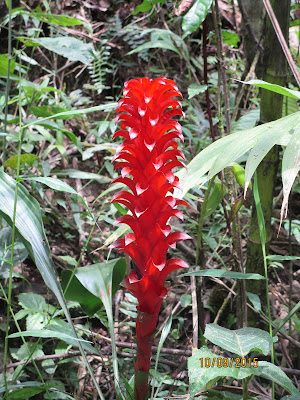Sooooooo there's this volcano....yeaaaaaah....that might be erupting.....sometime soon....
As with any bad news...I feel like there is no great way to start a conversation about our volcano situation...YES, there is a volcano in Ecuador that is about to erupt. YES, it is roughly 30-40 miles away from Quito. YES, when it does erupt we're thinking it could be a full-on Pierce Brosnan Dante's Peak situation....
 |
| 007 taking on volcanoes... |
That said....I'm writing to let everyone know that we are feeling 100% safe about the potential eruption! Let me back up a bit and remind you of the volcano I'm speaking of...yes, you know it well even though you may not remember.
These are some photos from our trip to
Tambopaxi last May. Tambopaxi is a hostel that allows visitors of Cotopaxi Park to stay just minutes away from the base of the volcano. We were so happy when we went last year that a clear day allowed for some gorgeous views of the volcano.
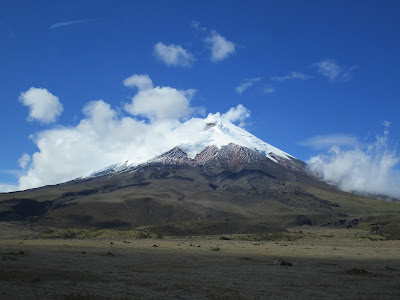 |
| Cotopaxi as seen in the park (doesn't she look calm and majestic) |
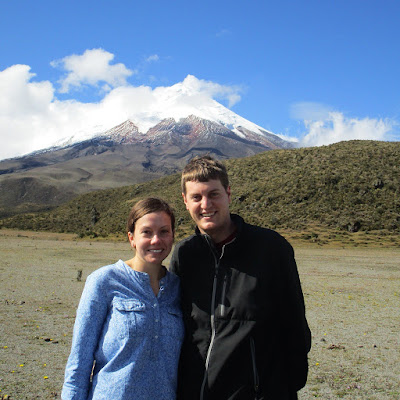 |
| Lots of smiling faces for this clear view of the volcano. |
 |
| Or you might remember that last April Javier and I actually took a hike up to the glacier of this same volcano |
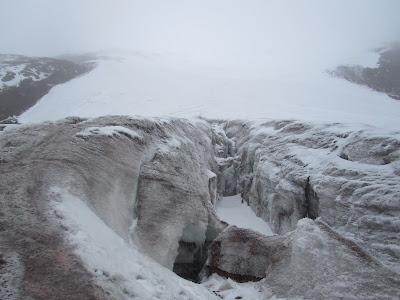 |
| Cotopaxi glacier as seen by the Cabezas, up close and personal. |
 |
| Cotopaxi is known for its rich red soil, seen just below the glacier from miles away. |
 |
| A few more shots from our stay at Tambopaxi in May (now I'm SO happy we had the opportunity to visit last year) |
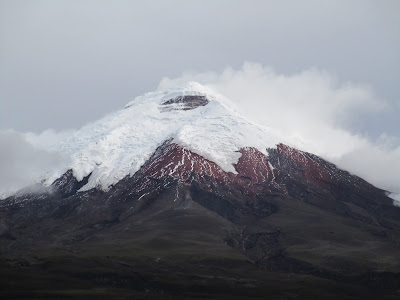 |
| There is a lot of snow on that volcano. |
Just after our visit this article came
out announcing the awakening of our sleeping volcano. Cotopaxi has not erupted in about 125 years. Since last June, there have been rumblings about the activity around Cotopaxi: increased seismic activity, water vapor and sometimes ash columns coming from the cone, etc. But sometime between last June and returning to school in August, it was pretty much determined that Cotopaxi
is erupting. Cotopaxi
will erupt. The big question that
no one can answer is
when. This means we (and the rest of Ecuador) are hanging out in a bit of limbo, preparing and waiting for this inevitable eruption.
 |
| This photo was taken by some friends of ours that had a chance to enter the park last weekend. This is the same Cotopaxi but with a much dirtier glacier, evidence of the spewing ash we've been hearing so much about. |
 |
| Lots of photos and tests being taken from the air. |
I hope the above video works, so you can see some footage taken above the active volcano.
But let's talk about why we're feeling OK about such a scary impending natural disaster. First off, if our luck holds out, the volcano may not even erupt this school year (not likely, but possible). Secondly, if we're remotely lucky, the volcano will erupt while we are at home in Quito. Quito is at an altitude of roughly 2,850 meters. Even with Cotopaxi's towering 5,897 meter peak, it is all but impossible for lava and/or mudslides to reach the city at such an altitude. (In addition to lava flows, a big concern for the eruption is the melted glacier that will create flooding and large mudslides). If the volcano erupts while we are at home, the worst damage we will see is ash fall. I'm learning a lot about ash these days, mostly that it sucks. Ash has been described as tiny, thin particles of cement that can ruin water supplies and damage machinery if it gets in. This means we'll be on our own for water and electricity for a while after the eruption (but thats manageable within the comforts of our own home).
 |
| My labeled map to help you picture our location. I've marked Cotopaxi, circled Quito, and the arrow points to Cumbaya, the town in the valley where our school is located. |
As seen in the map above, our school is 'in the valley' meaning not nearly at the altitude of Quito. While option #3 (the volcano erupts while we're at school) is by far our worst scenario, it is still not a dangerous one. Because of Colegio Menor's location within the valley (and away from the river that they think will receive the majority of mud/flooding from the volcano) it is actually an emergency evacuation site. This means, that as people are evacuated from nearby the volcano they will be sent to stay on the grounds of our school (mostly in the gym and on our soccer field). In other words, we will be 100% safe at school as well. Our only concern is the idea of being stuck in our classroom (avoiding ash fall) with 15 or so teenagers for multiple hours on end. School is preparing for a mass closure of roads after the eruption, meaning that many of our kiddos will be stuck at school. In fact, each student was required in the first week of school to bring a Cotopaxi emergency kit, complete with: 1 liter of water, a can of tuna, 3 nonperishable snacks, goggles, cap, mask, and blanket. (Don't worry, teachers were required to bring the same). Based on the information we've received so far, it seems likely that if the volcano erupts while we are at school, we will be stuck there for 24-72 hours. Yikes! We had our first volcano drill this week and after 10 minutes in my room, my students asked in pained and whiny voices 'how long is this going to take?!?!' Needless to say, both they and I will struggle to last a 24 hour lock-in post-eruption...I instructed them all to add games and playing cards to their emergency kits.
 |
| Icon posted all over school with Ecuador's recommended supplies for the volcano eruption. |
While I'm complaining a bit about the prospect of babysitting my kiddos in a very enclosed environment for a multitude of hours, the truth is that the volcano could have very deadly results. There are a number of towns and thousands of people living directly in the path of its destruction. If and when Cotopaxi does erupt, I predict it will make world news. (It has already started a bit if you read
here and
here). We're all but certain that internet and cell phone service will be out for a number of days directly following the eruption, so I'm telling you now that we are safe (100%). We'll fill you in on our survivor stories as soon as we can, but send thoughts and prayers to a country that will likely struggle to handle such a disaster.























